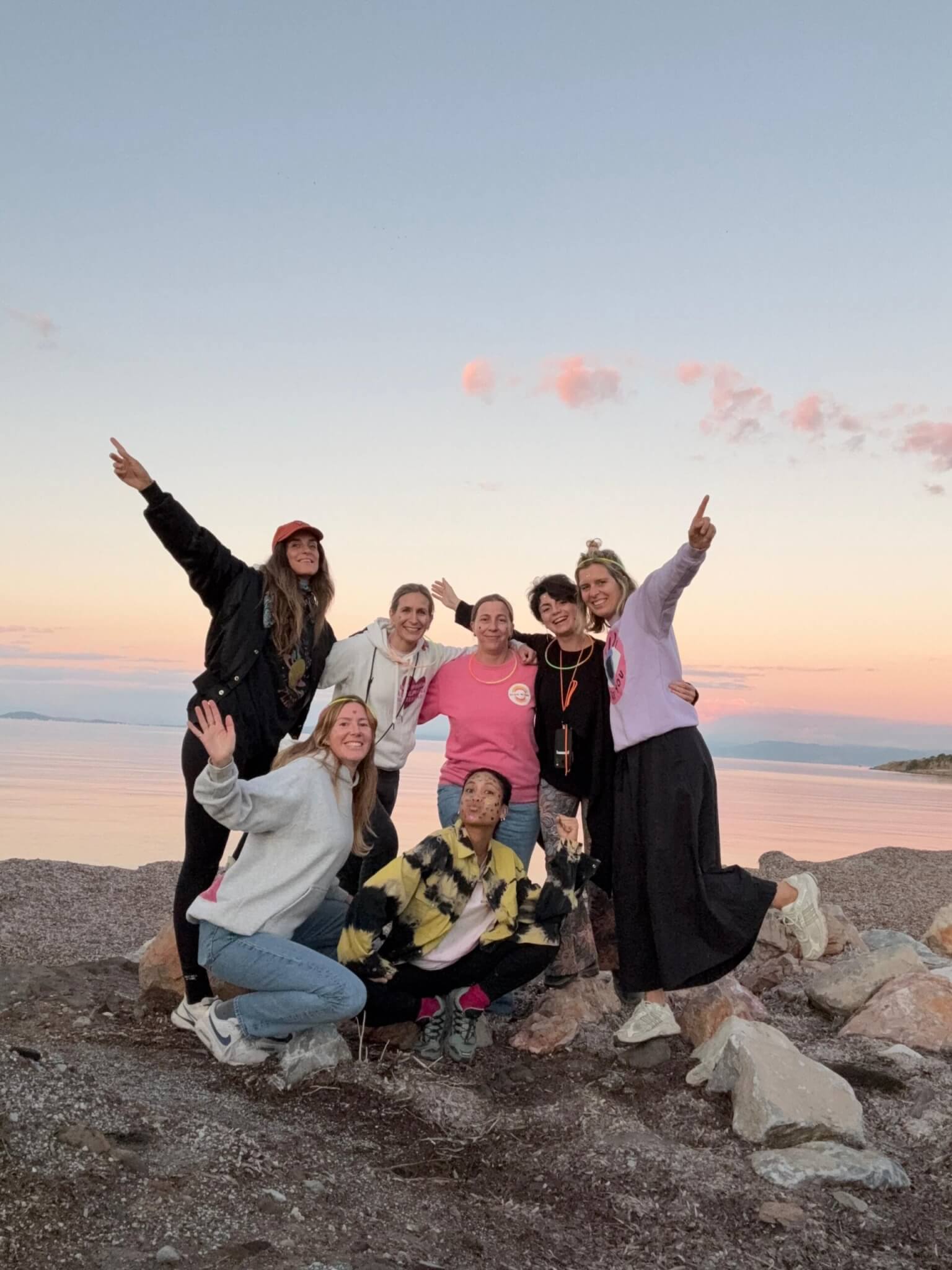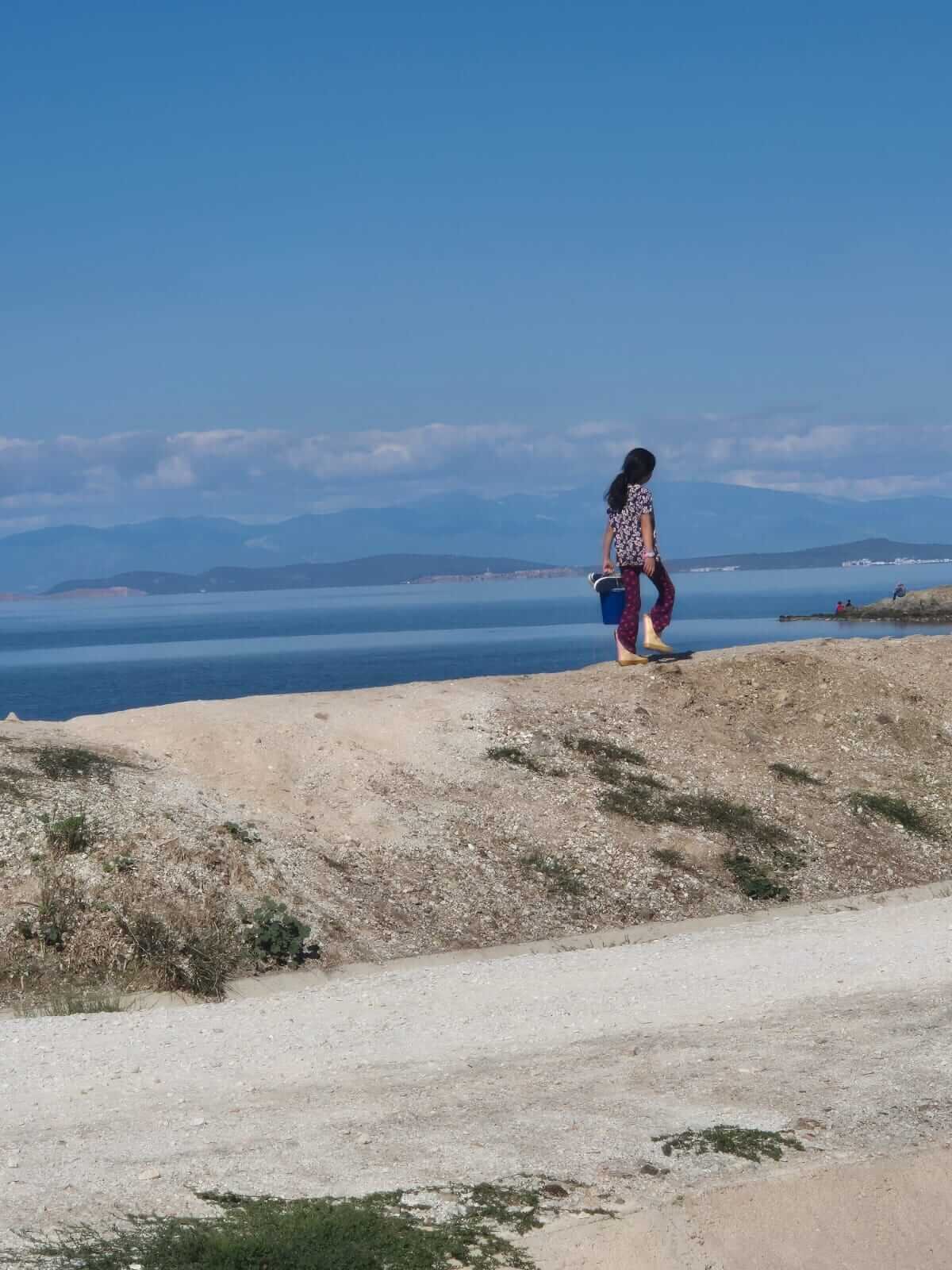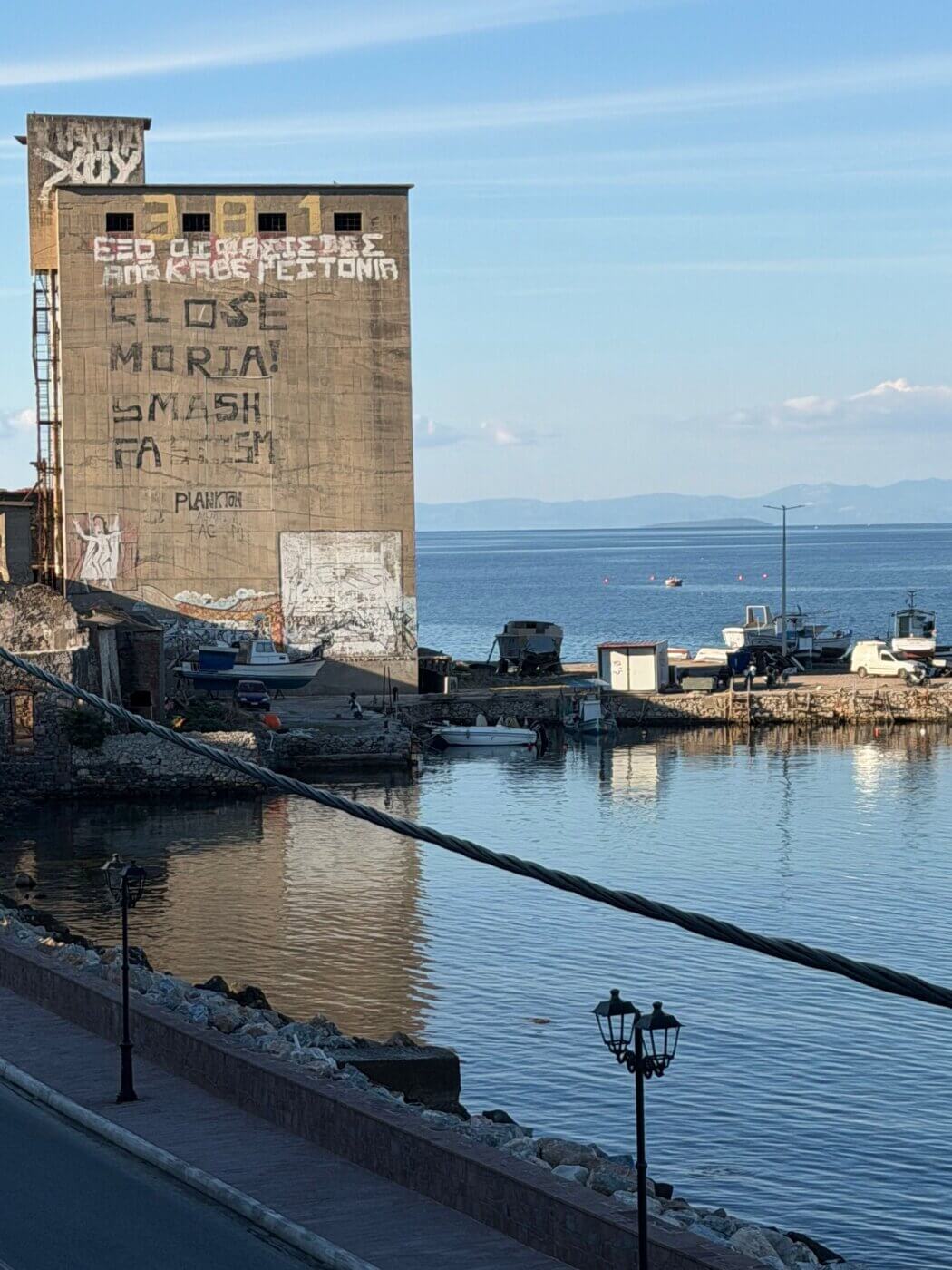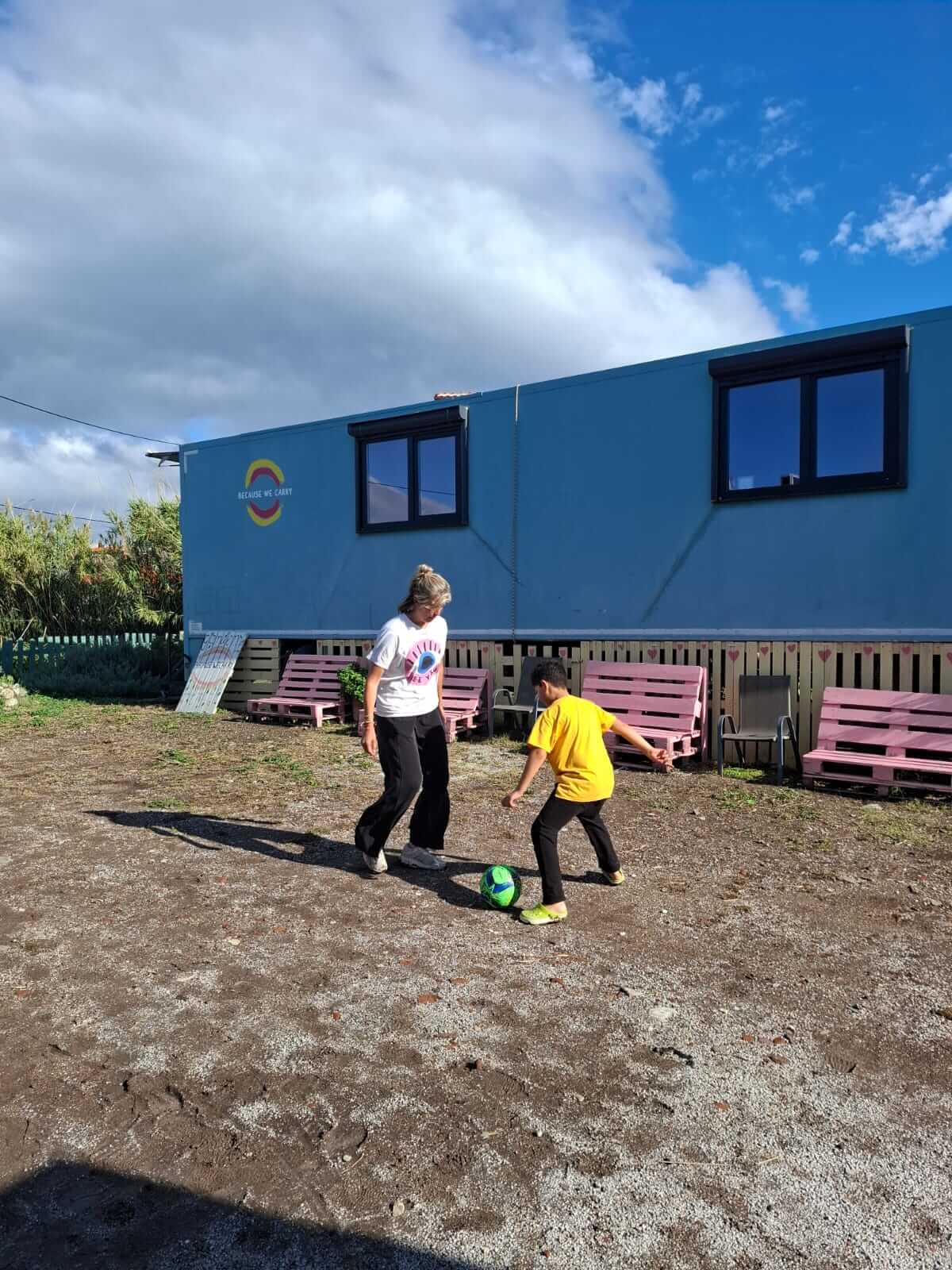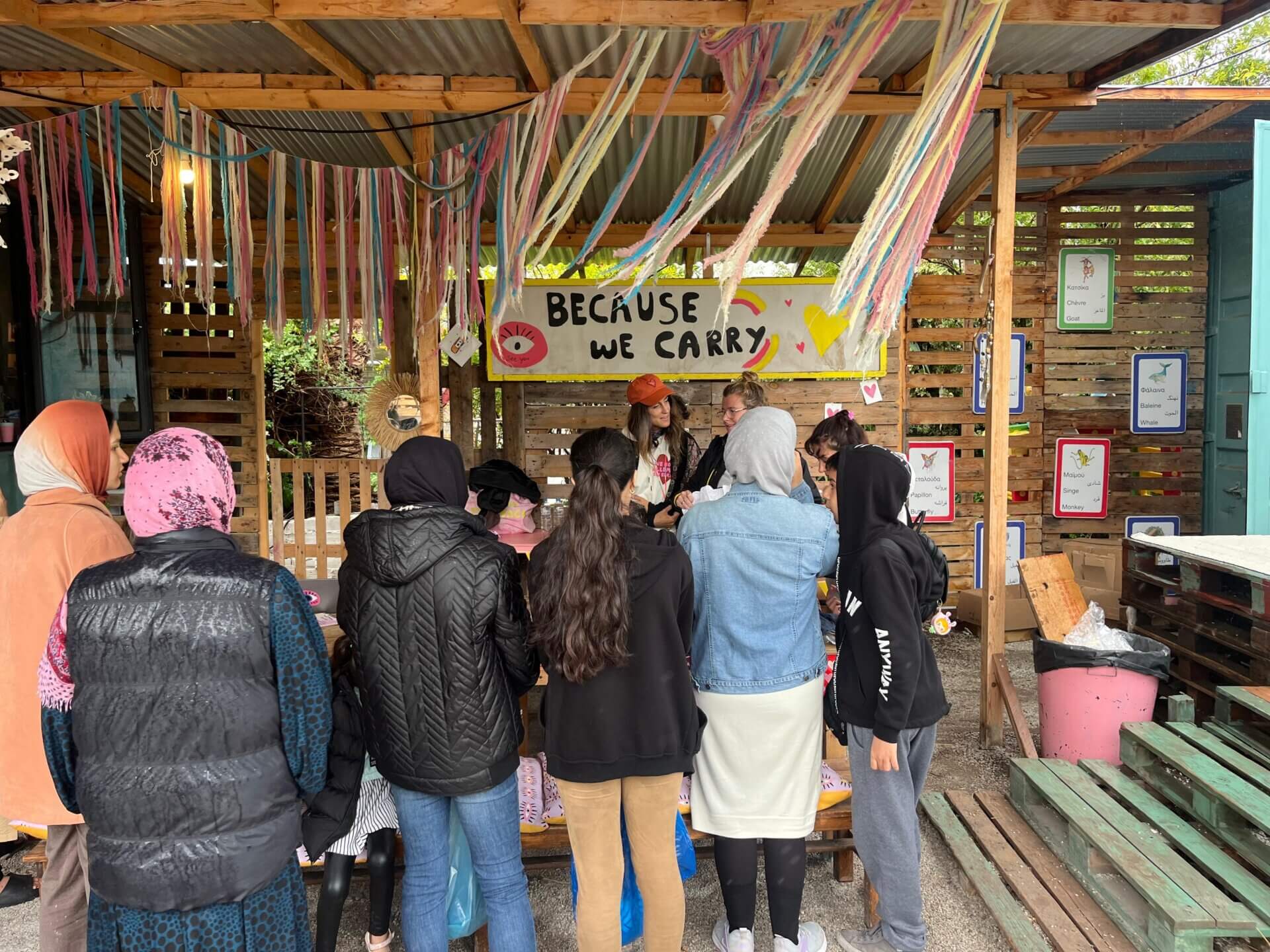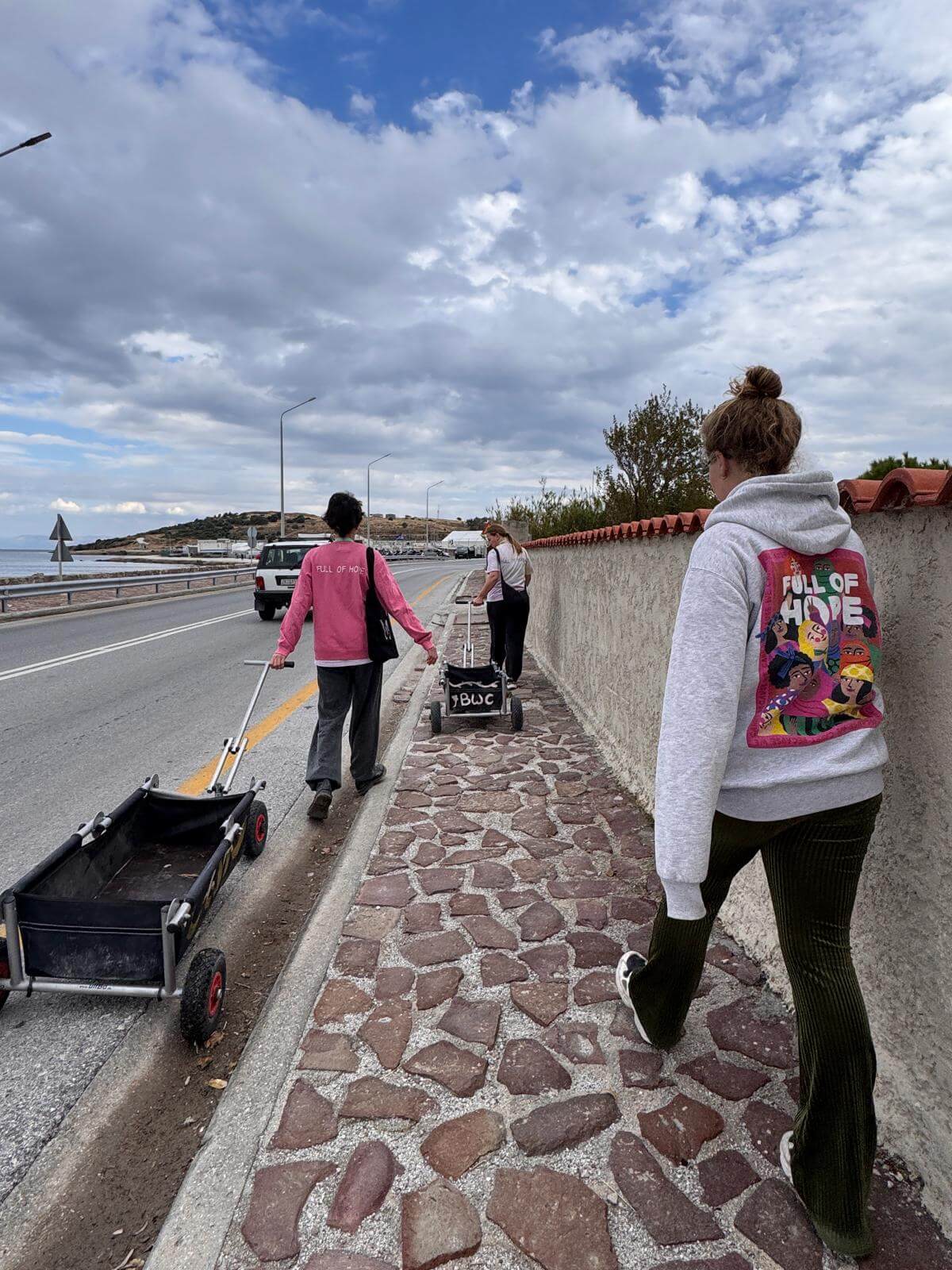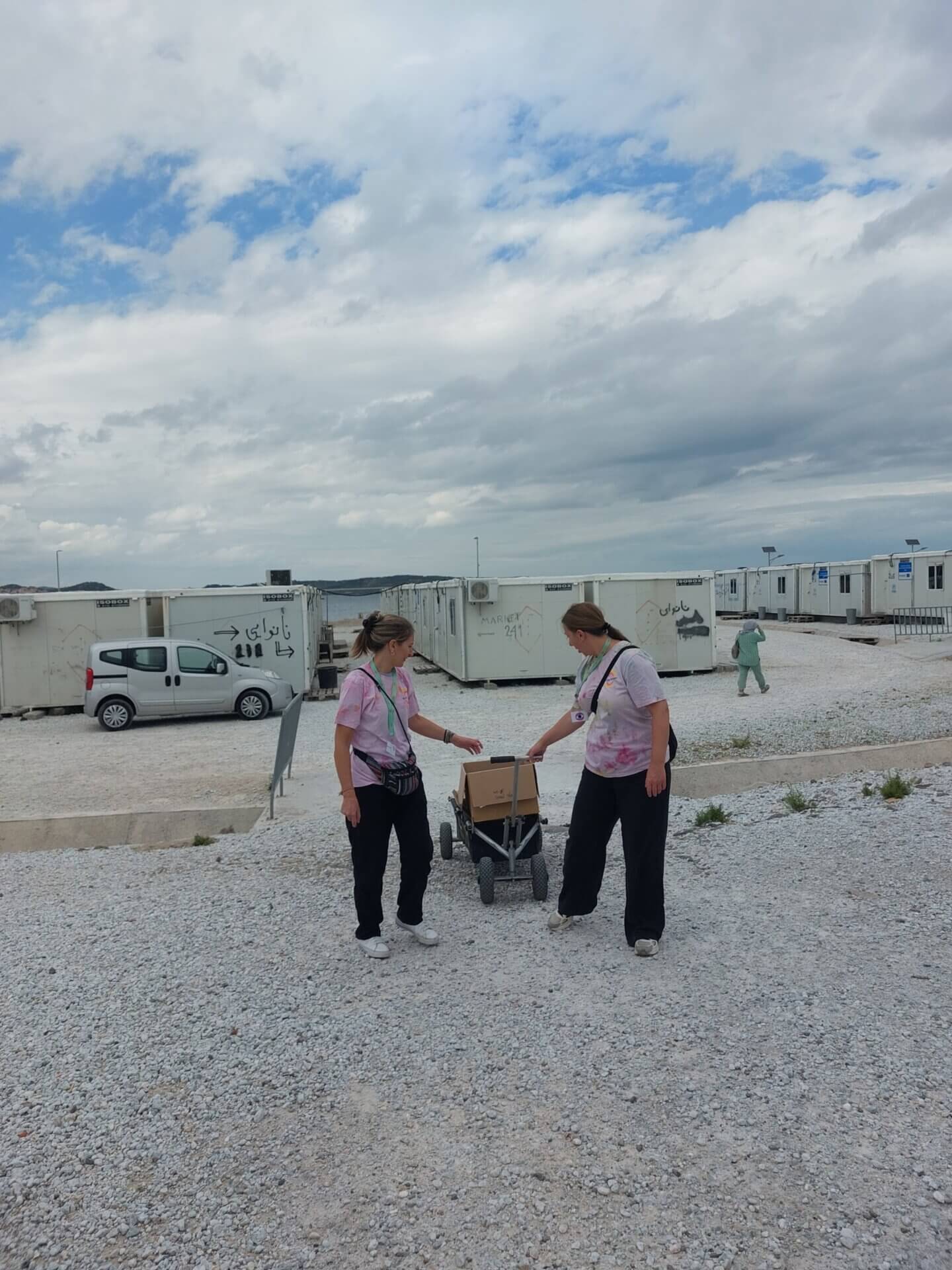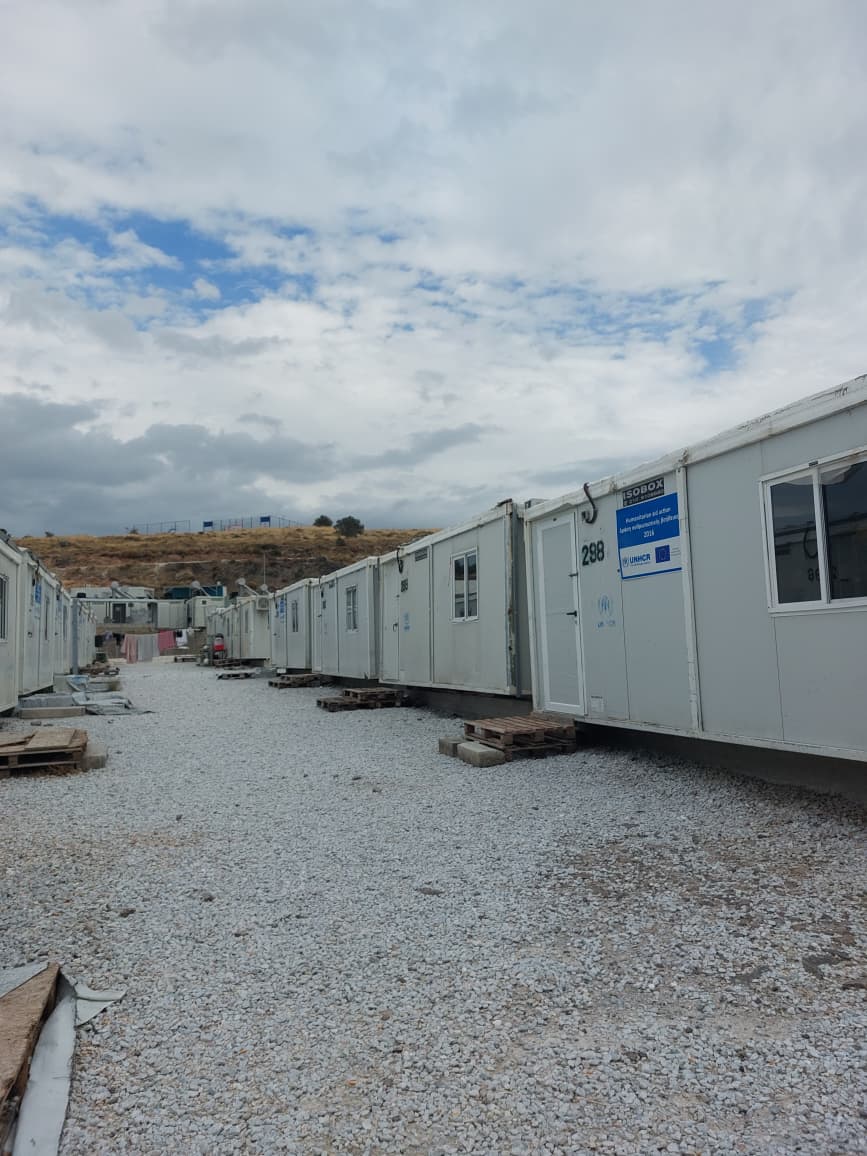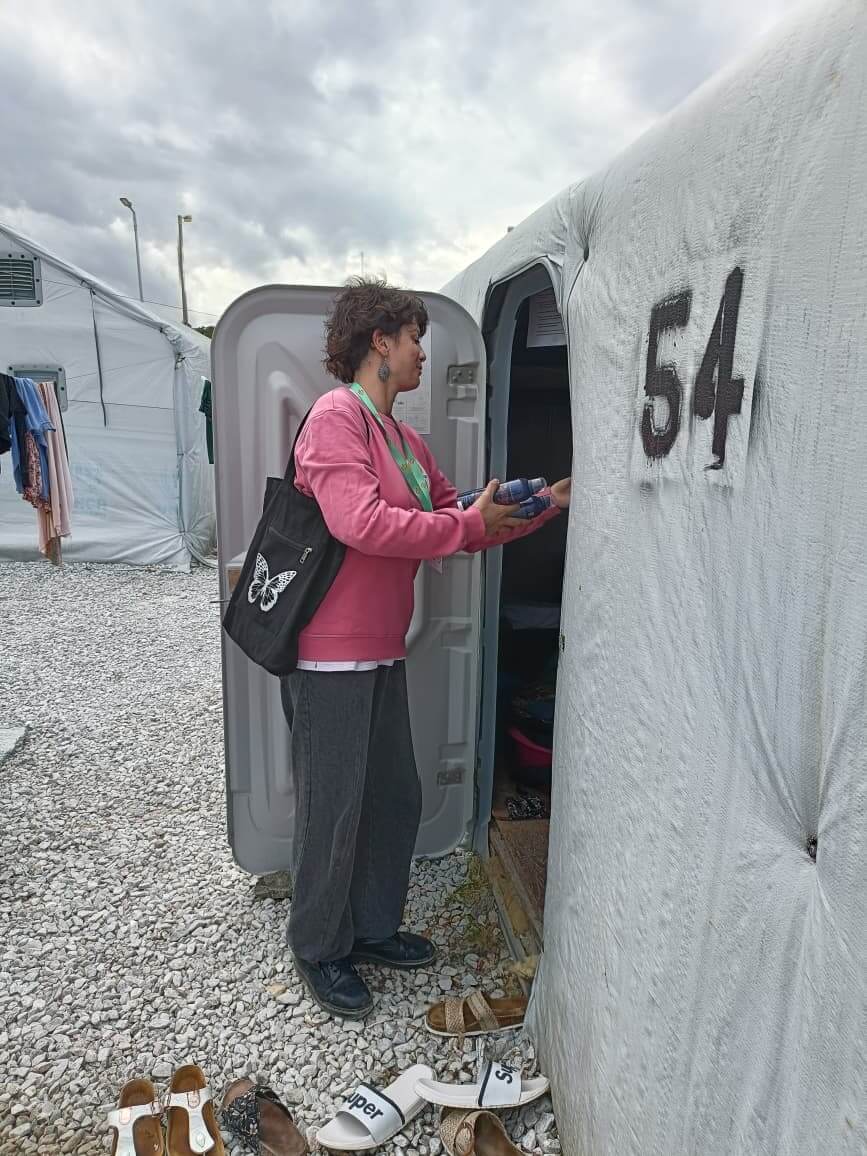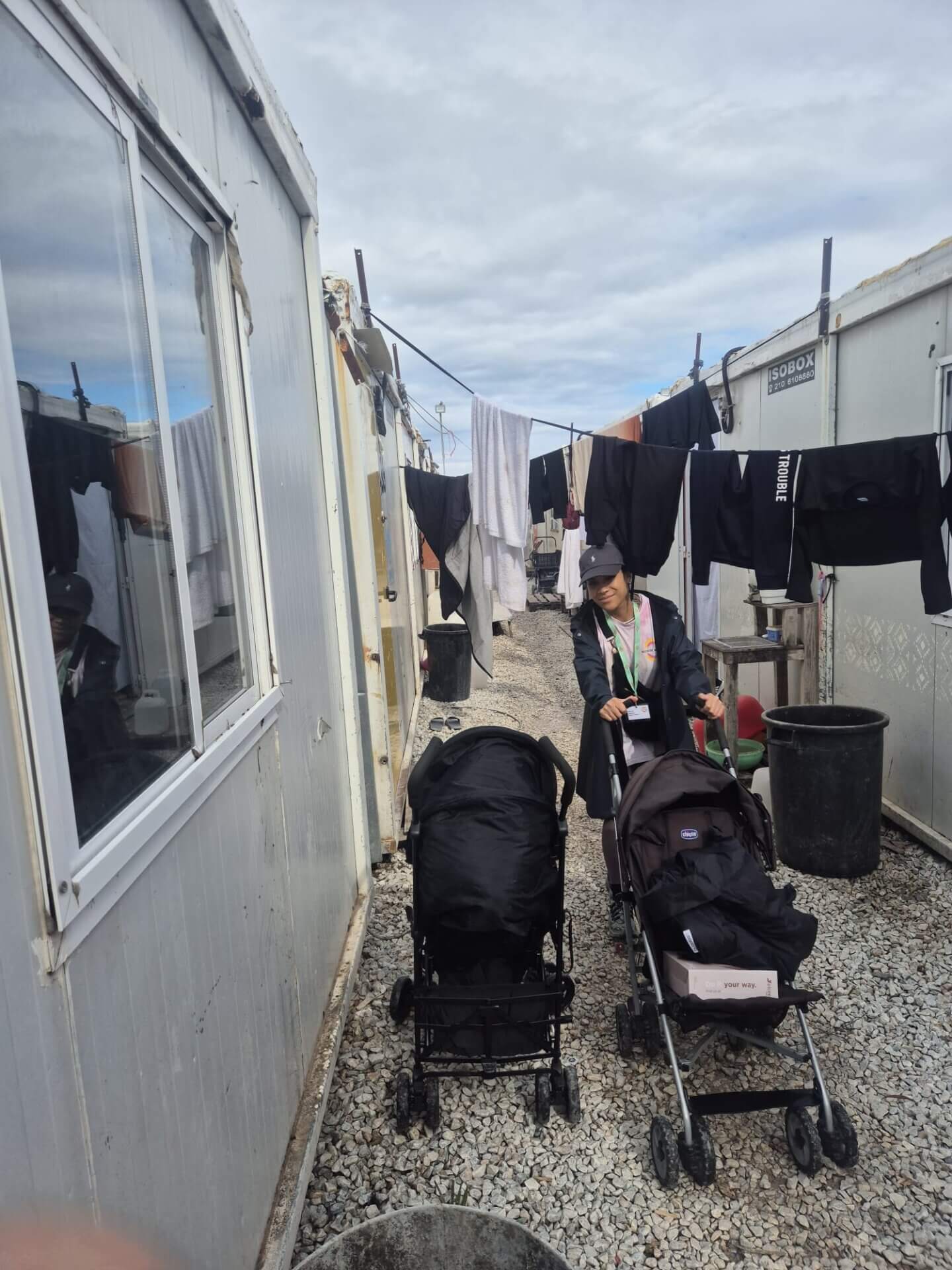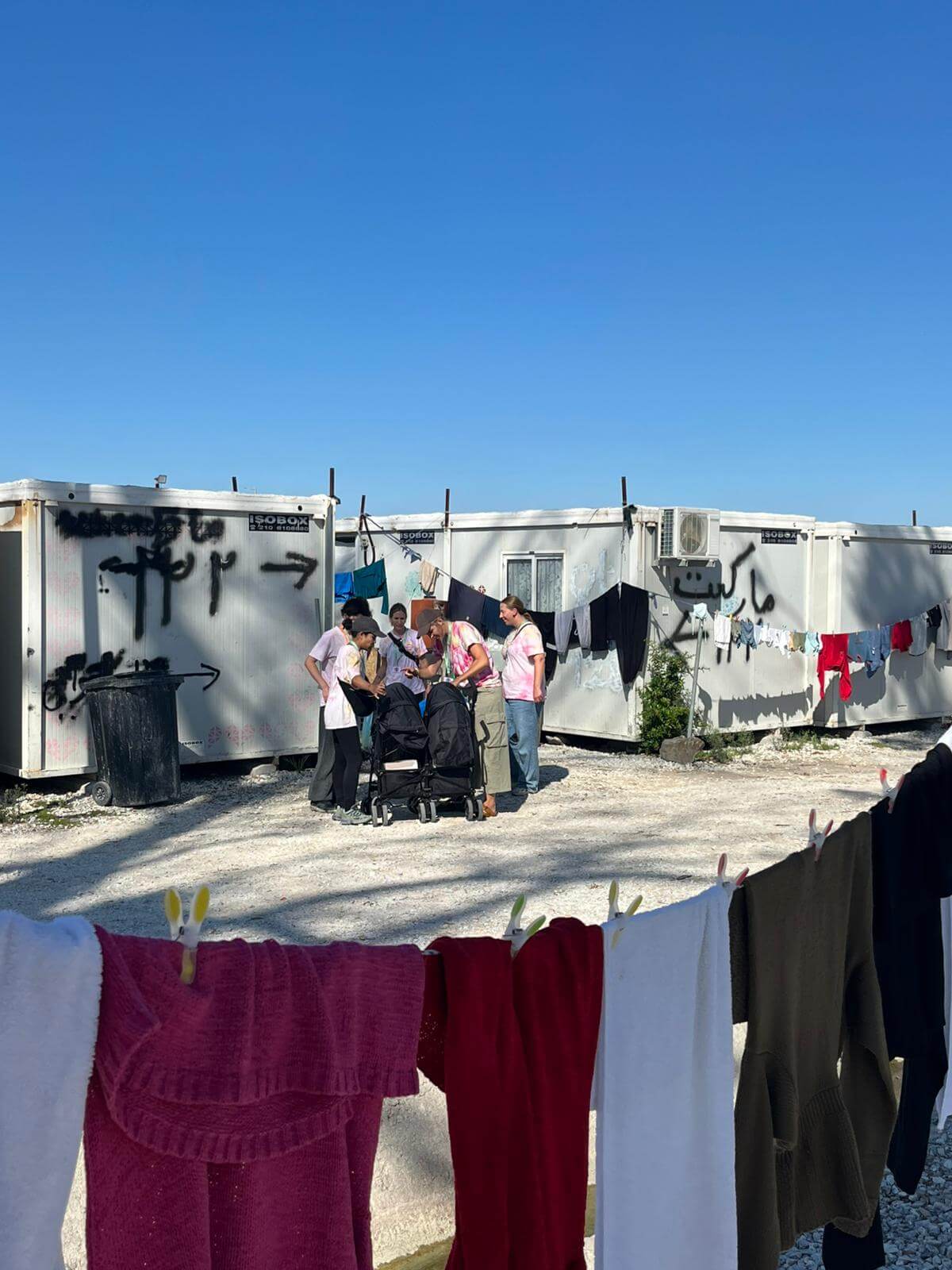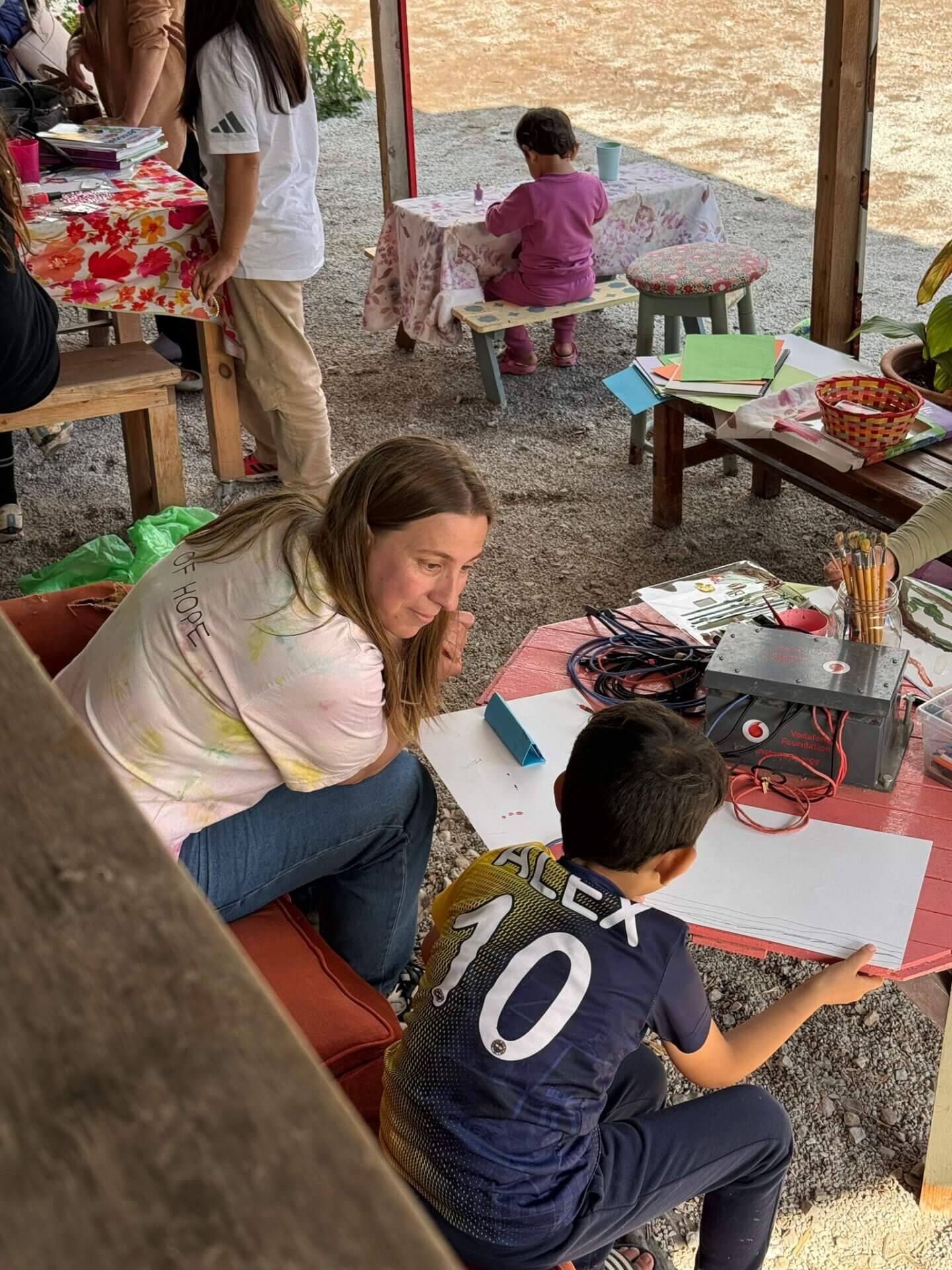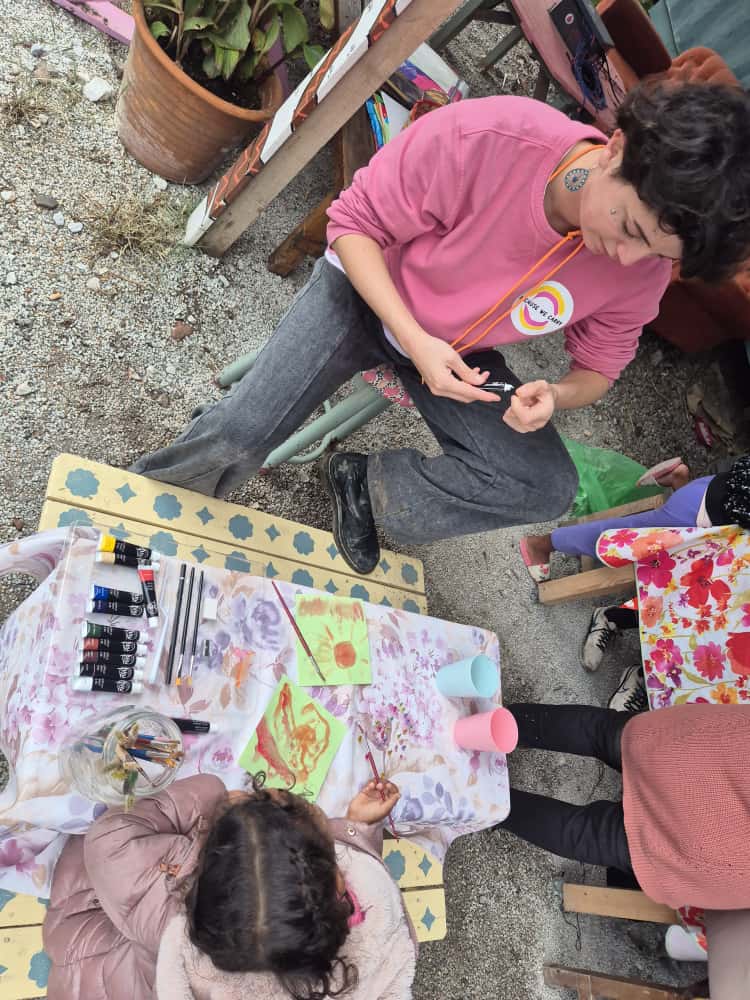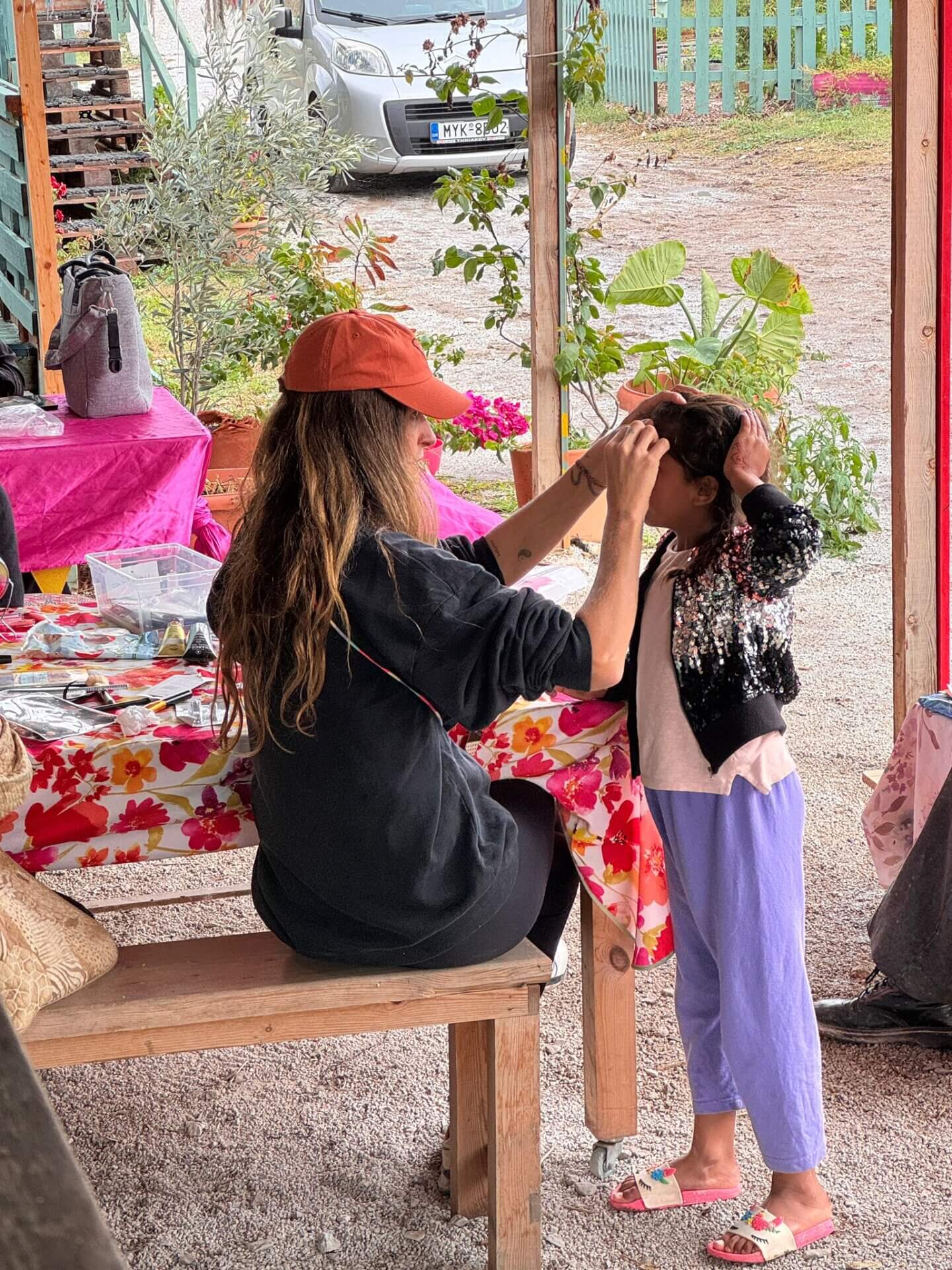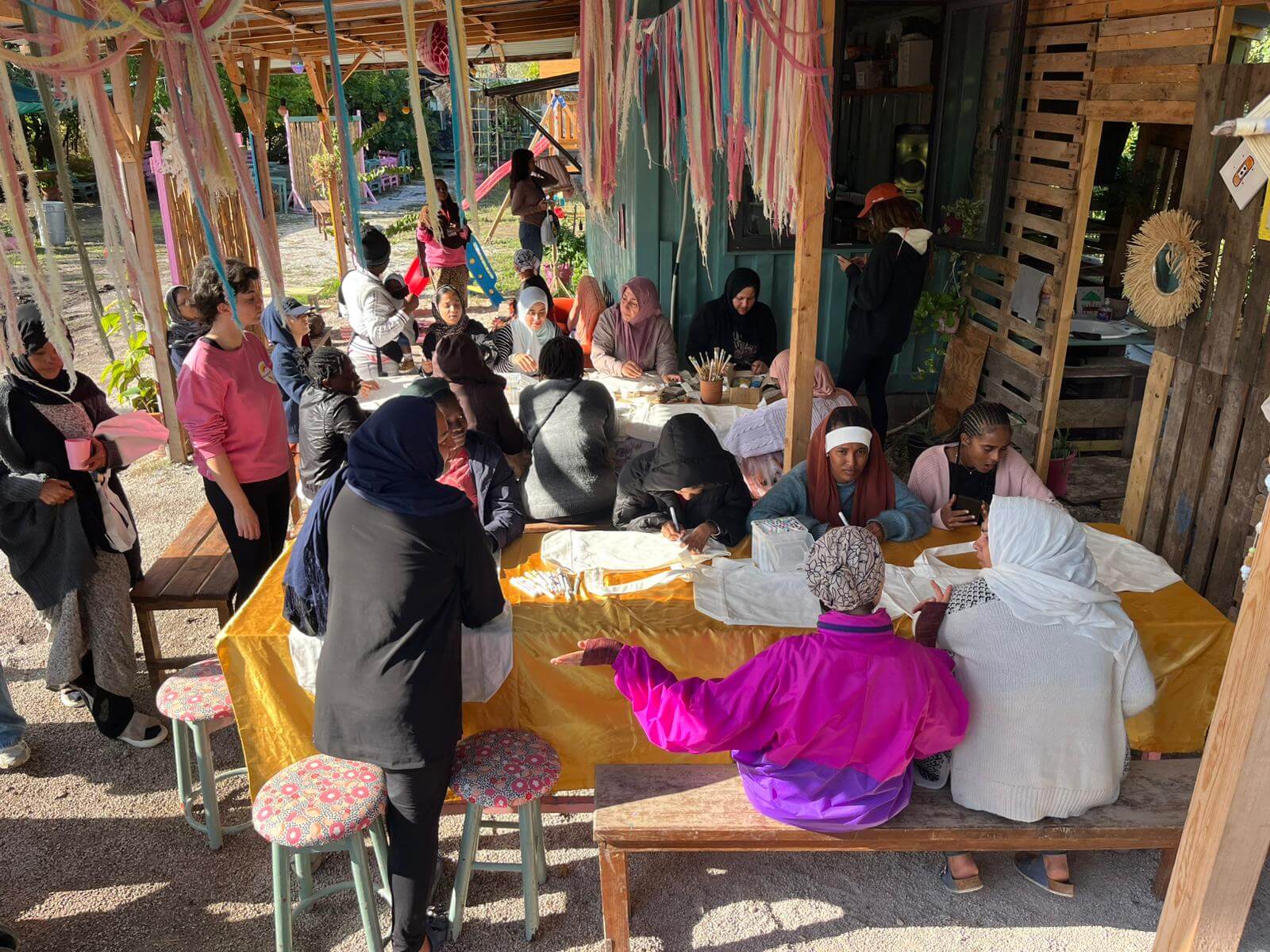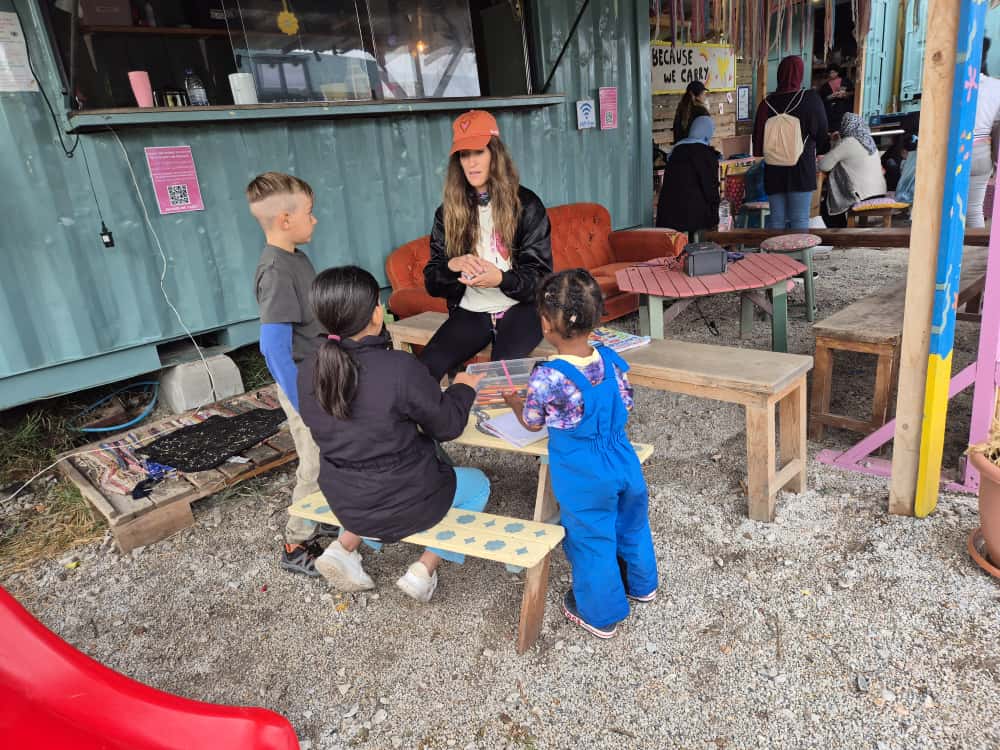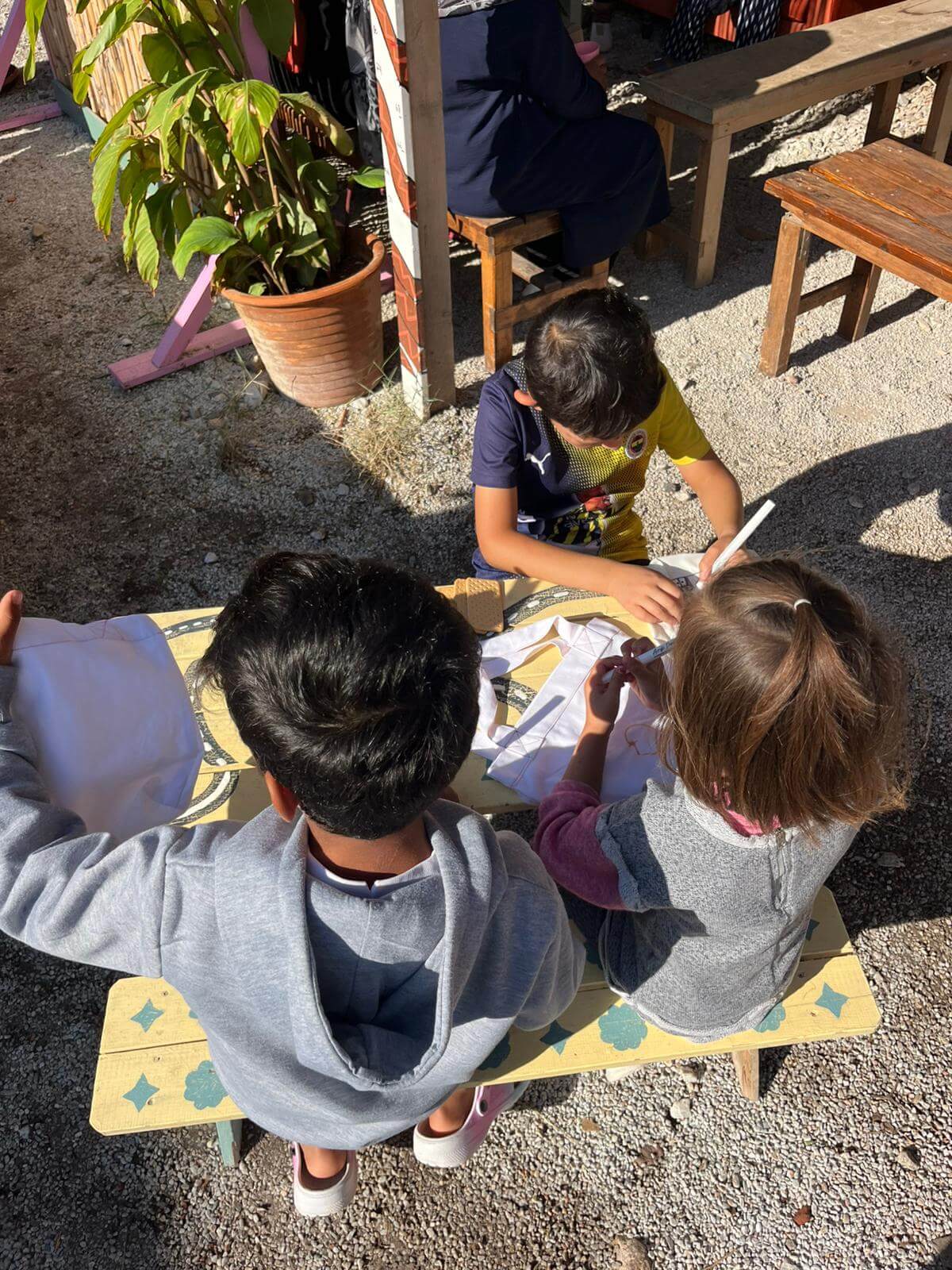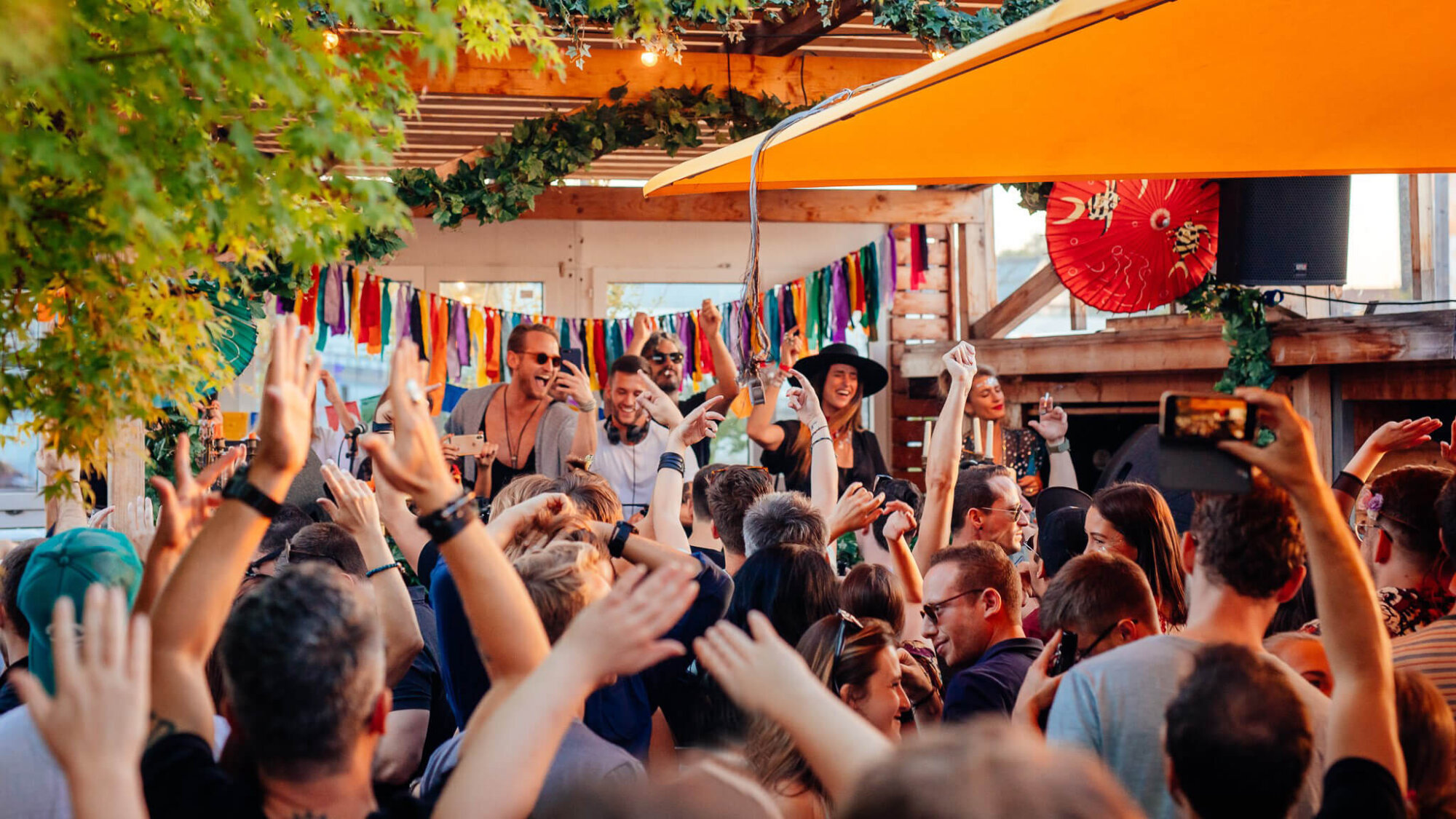Welcome to Mytilini
It’s Monday morning of October 5th, and a new week begins for The Gardens of Babylon team… but this time, in a new and special place. From all over Europe, members of our family have reunited in Lesbos, a small Greek island few miles away from Turkey. Here we will collaborate with Because We Carry, a non-profit organization that has spent years supporting refugees and displaced families. Two different worlds with a shared belief: active compassion, not abstract. Music may bring people together at festivals, but it’s empathy that connect us.
The sunrise greets us warm and bright, charged with positive energy, which encourage us to begin this new journey. Just a few steps from the door, it’s impossible not to notice a striking graffiti painted high on an old tower. Its bold black lines stand out sharply against the deep blue of the sea:
Close Moria! Smash Fascism.
It’s our first glimpse into the island’s complex reality: a reminder of the tension that locals have breath for years. Across the sea lies Turkey. On clear days, its villages are visible from the coast. This view gives us an hint why Lesbos has become such a focal point in the story of migration.
Mytilini is the most populated city of the island, with about 29.000 inhabitants. When migration was at its peak in 2016, because people from Syria, Afghanistan and Iraq were fleeing war and persecution, Moria Refugee Camp, just few miles away from Mytilini, reached 25.000 refugees. With a maximum capacity of 3.000 people, Moria was unprepared for such a massive influx. By 2019, it was described by NGOs as the worst refugee camp on Earth. Insufficient sanitation, food, and healthcare, violence, diseases.
In 2020, the camp was destroyed by a fire, causing no deaths but leaving more than 13.000 people without shelter overnight. Families were forced to sleep on roadsides and fields until a new campsite, Mavrouvouni, was built. We’re heading there.
Between life and survival
Driving along the road, it’s impossible not to notice how broken, abandoned, and forgotten everything looks. Ruins everywhere, unfinished buildings left to rot.
After just five minutes after departing from Mytilini, we see what from far looks seems like a huge white camping. A closer look reveals rows of white tents, so tightly packed that no one seems to move between them. From here, it almost feels uninhabited. A vast wasteland. Only police officers walk around the perimeter, enforcing the sense of a restricted, uncrossable boundary. We bypass it for now, heading to meet the team of Because We Carry.

BWC was founded in 2015 by a group of women in Amsterdam, tired of the gap between humanitarian rhetoric and practical help. By deciding to act, they have been successfully supporting women on the move for years: mothers with children, pregnant women and families… Providing baby carriers, prams, nappies, diapers, maternity supplies. All basic items, but crucial. Imagine a child growing up without all the items listed above.
Really.
Just stop for a second. Read again the list of supplies and imagine not having all of that, as a mother who has just given birth.
The fact that an NGO has to step in because governments fall short is alarming, yet this is the reality. But BWC work goes beyond material aid. They offer social support, create safe spaces through small activities, and help mothers navigate medical care and local services. Some families stay in Mytilini for a few months, others for more than a year. It depends on the length of bureaucracy to provide documents to be moved to another country. Survival began long before they arrived here, and they know it will not be over soon. But in these moments, in this safe space, a little living is possible. Not just surviving.
‘Full of hope’
BWC is called “The Garden”. Refugees can easily reach it by walking few hundred meters from the camp. It is easily recognisable by its red gate. Passing through the gate is like finding a patch of green in a grey side of the island: peppers, courgettes, and salad grow under the sun. Shahzaib, the gardener, greets us. Later, we learn he was a refugee in Moria years ago; now he has lived on Lesbos for several years. He smiles and continues working the soil. Three pink and light-blue containers, with windows, doors, and little staircases, stand nearby. One of them is a storage, one is a space dedicated to workshops for pregnant women and the other is free-shop. In the back, facing the red gate, we can see the kitchen and the playground for children. It is quite muddy at the moment so not easily accessible, but a beautiful park is built for women to hang out, with many benches and tables composed in a circle.
BWC facilities
We are welcomed by Sanne, who will be responsible for our presence in the camp this week. She has been living on the island for one year and a half. She introduces us to the permanent volunteers: Shahzaib, Myrthe, and Irene. We introduce ourselves: Shishi, Nana, and Camilla from TGOB, along with Inge from Brussels and Sara from Zurich, who have joined TGOB gatherings before.
We start the week with a long, necessary briefing from Sanne. She paints a vivid and painful picture of Lesbos’ recent history. Understanding this context is essential.
The new refugee camp hosts between 600 and 800 people. New migration policies have made reaching the island even harder: today most boats are pushed back. People make long journeys from their ccountries to Turkey, sometimes on foot, sometimes with smugglers. Once there they pay thousands of euros to board small, inflatable boats. Though the crossing could take three hours, it is deadly. Overcrowded boats cannot bear the weight of so many bodies pressed together, each person fighting to survive. Boats sink frequently: many die in the water. Weekly. Few reach the island, many are pushed back, forced to relive the deadly route once again.
Over the weekend (4th-5th October), about 200 people reached the island by boat from Turkey, mostly coming from Afghanistan, Somalia, Sudan, and Eritrea. But also Syria, Guinea, Cameroon, Yemen.
Not everyone made it. One woman drowned at sea.
The news hangs heavy, and for a moment our faces freeze in a silence that feels like a confrontation with reality. Then Sanne’s voice brings us back:
“We want to bring positivity into the camp,” she reminds us. “These people don’t need our sadness for them, they need our energy. Empathy, yes, but not pity. If they want to share, wonderful but it must always come from them first’’.
Questions about nationality or personal life are off-limits. Curiosity is ours to carry quietly; digging deeper would risk stirring traumas we could never fully comprehend or hold.
Our list is smaller than 200, because Because We Carry works exclusively with women and families with children.
But we’ll soon discover that this is not it. Until the end of the week we will receive other lists. With many other names.
According to Aegean Boat Report, in the week of 6th-12th October, 174 people arrived in Lesbos, in 5 boats. On October 7, just our second day, 34 people were found safe ashore while 4 bodies were recovered. One of them was a kid. One of many drowned in the sea in last decades.
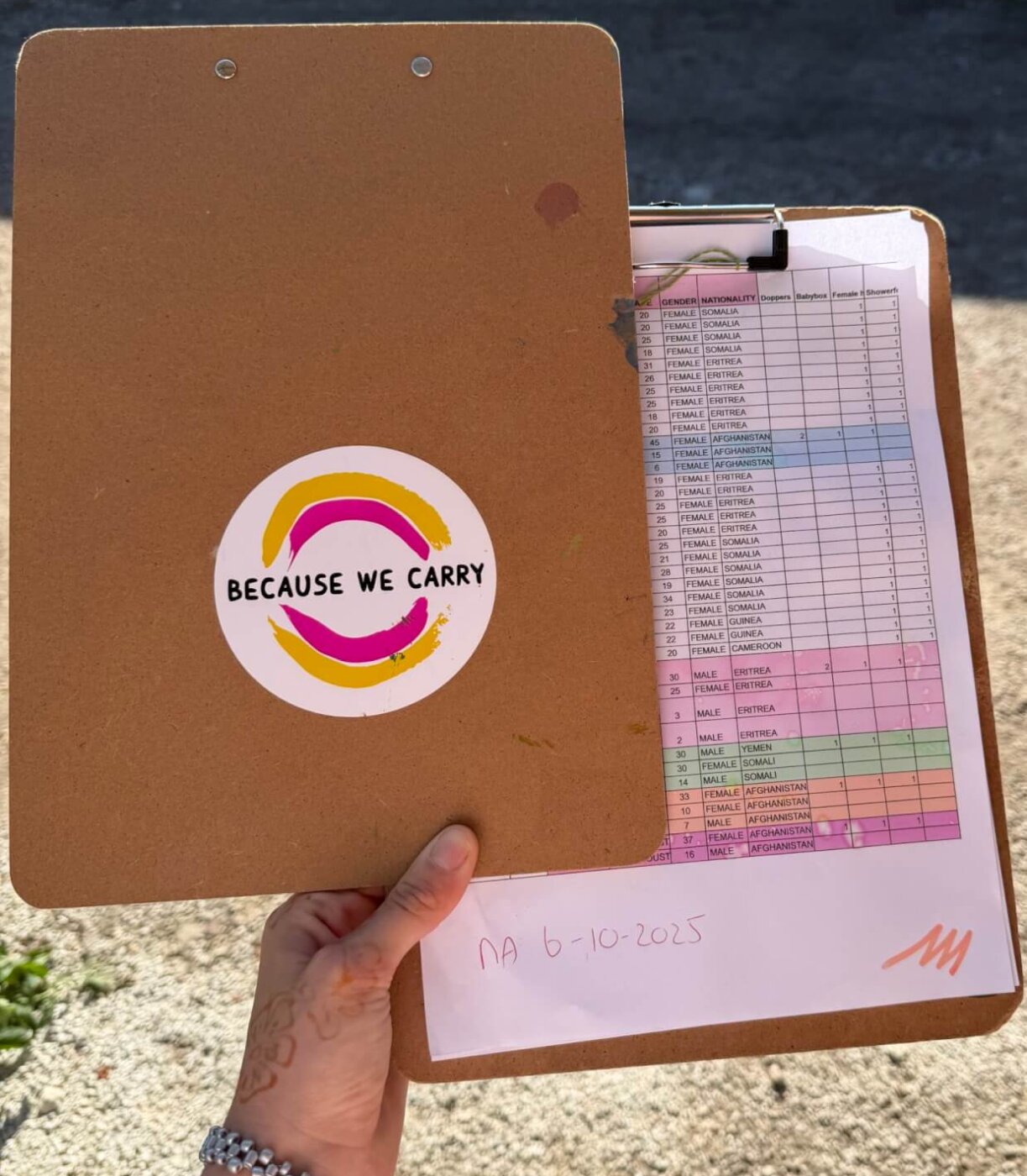
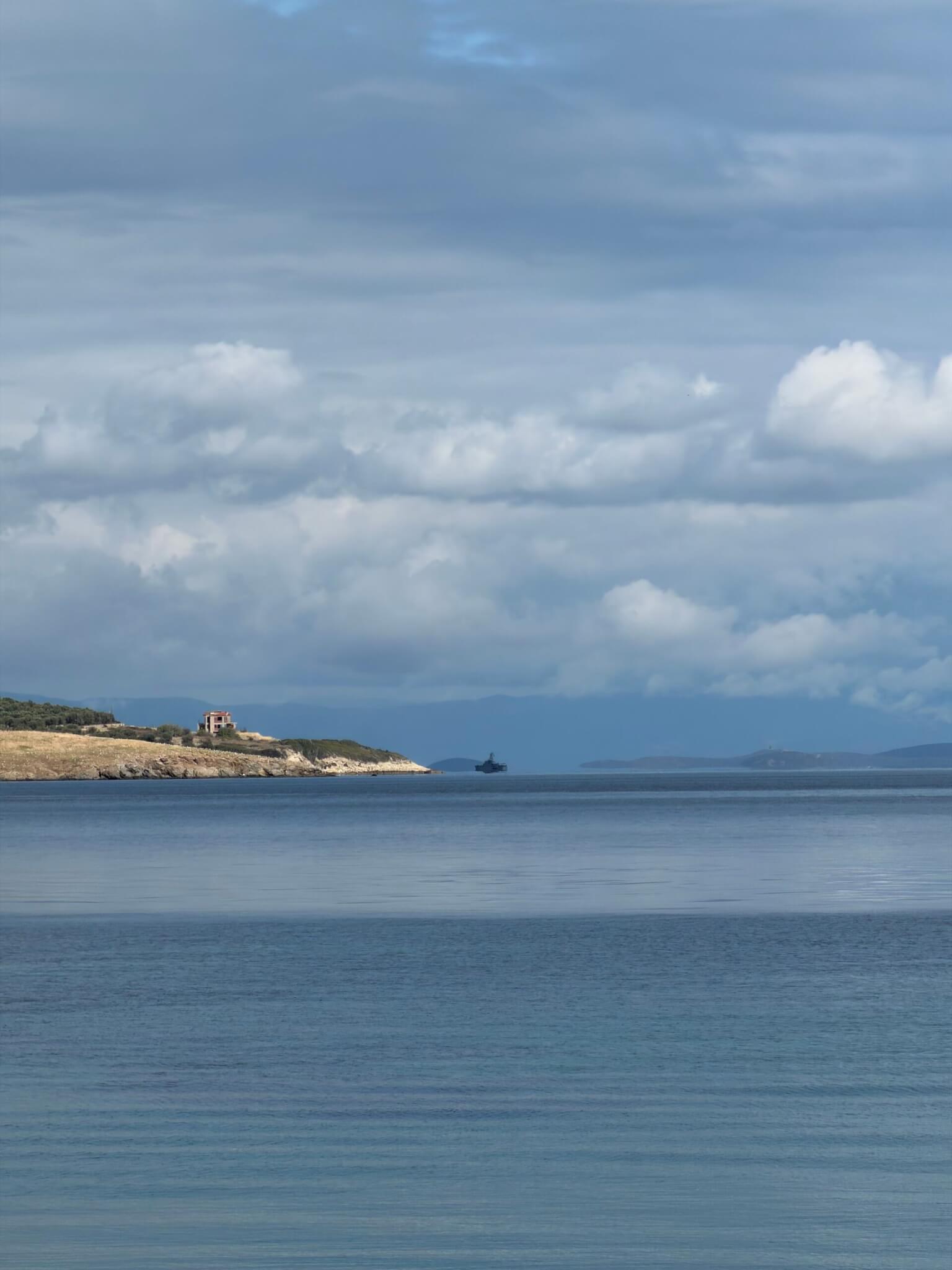
How can THIS feel like hope?
From the organization’s garden, we walk toward the camp with empty trolleys in hand, while Sanne drives ahead with the van full of supplies. At the gates, we unload boxes of hygiene kits, strollers, and essentials, then split into teams. Today we knock on the doors of new arrivals, deliver basic kits, and share information about activities: beauty mornings, creative afternoons for children, pregnancy workshops, and a small celebration planned for later in the week.
The tents are divided into three areas: single females, single males or families. In a 8 meters square tent live on average 6 people. Officially it is not allowed, but many of them are cooking. As doors opens, delicious spices flavours come out through the smoke coming out from the dark of the tent. Life compressed into such small, humid, warm spaces feels almost impossible.
People recognize Sanne and Irene instantly. They smile, greeting and hugging them: a simple visit bringing immense joy. Everyone seem happy to see the familiar faces of the organization and run towards us to greet us or request new supplies.
Other NGOs work here too, each filling gaps left by a system that often turns away. That collectivity, that shared humanity, breathes hope into the camp. ‘Full of hope’ is the slogan written on the BWC sweaters.
On Thursday we also deliver strollers. One eight year old boy breaks into tears of joy at the sight of one. A simple object transforming daily life in ways we cannot fully understand.
Volunteering at Mavrouvouni camp
We invite the women to join our Whatsapp group to stay updated with the organization’s activities. But not all of them can make it: some of them have no sim card and some of them have no id yet. Upon arrival, everyone goes through the same identification process. Those who have no identity card at all however will have to wait for a bit longer and until then, the access to the outside world will be prohibited. Until then, all they will know of this beautiful Greek Island will be a cement land with white tents.
We can’t help but notice how everyone around us is smiling in one of the most unique, genuine, warm way. Happy to see us, happy be here, even in this place that holds so much pain.. Their joy catches us off guard. Afraid of showing emotions that might reopen wounds, we mirror their smiles, hiding the unease inside. Somewhere in the back of our minds, a little voice is wondering : Are any of them related to the woman who died on the boat this weekend? But curiosity is dangerous, and we keep our mouths shut, in disbelief of how these women seem happier than us while owning nothing more than a pack of second-hand clothes.
What must their lives have been before this, if THIS nothingness feels like hope?
Moments of freedom
Each morning at BWC begins with a sense of purpose, a mix of excitement and tenderness. Women arrive early, children by their side, to request clothing, supplies and clothes for their children. They line up holding the ID cards of their little ones so we can find the right size shoes or warm clothes. Communication is simple: smiles, gestures, and often the help of Google Translate.
Some of us spend the day in the storage room, surrounded by boxes of donated clothes and tiny shoes. Others are immediately swept away by the children. One volunteer is adopted by a little girl who won’t let go of her hand for hours. They swing, color, and chase each other around the garden, speaking in a language made of smiles. Nearby, a few boys sit quietly with paintbrushes, lost in their own worlds.
One of them paints a small boat caught in huge and scary waves. The longer you look, the heavier it feels. Details that narrates a story that no child should not be telling. Scary and sad faces on the boat, with blue paints covering its floor and angrily invading their space. All of us cannot avoid facing the harsh reality that these kids. Even if smiling and apparently happy, will always carry with them traumatic experiences. This draw us back to reality and a thought goes to the kid died drowned by the Mediterranean sea and a blind societyy few days ago. This child, we are playing and having fun with, could have been him.
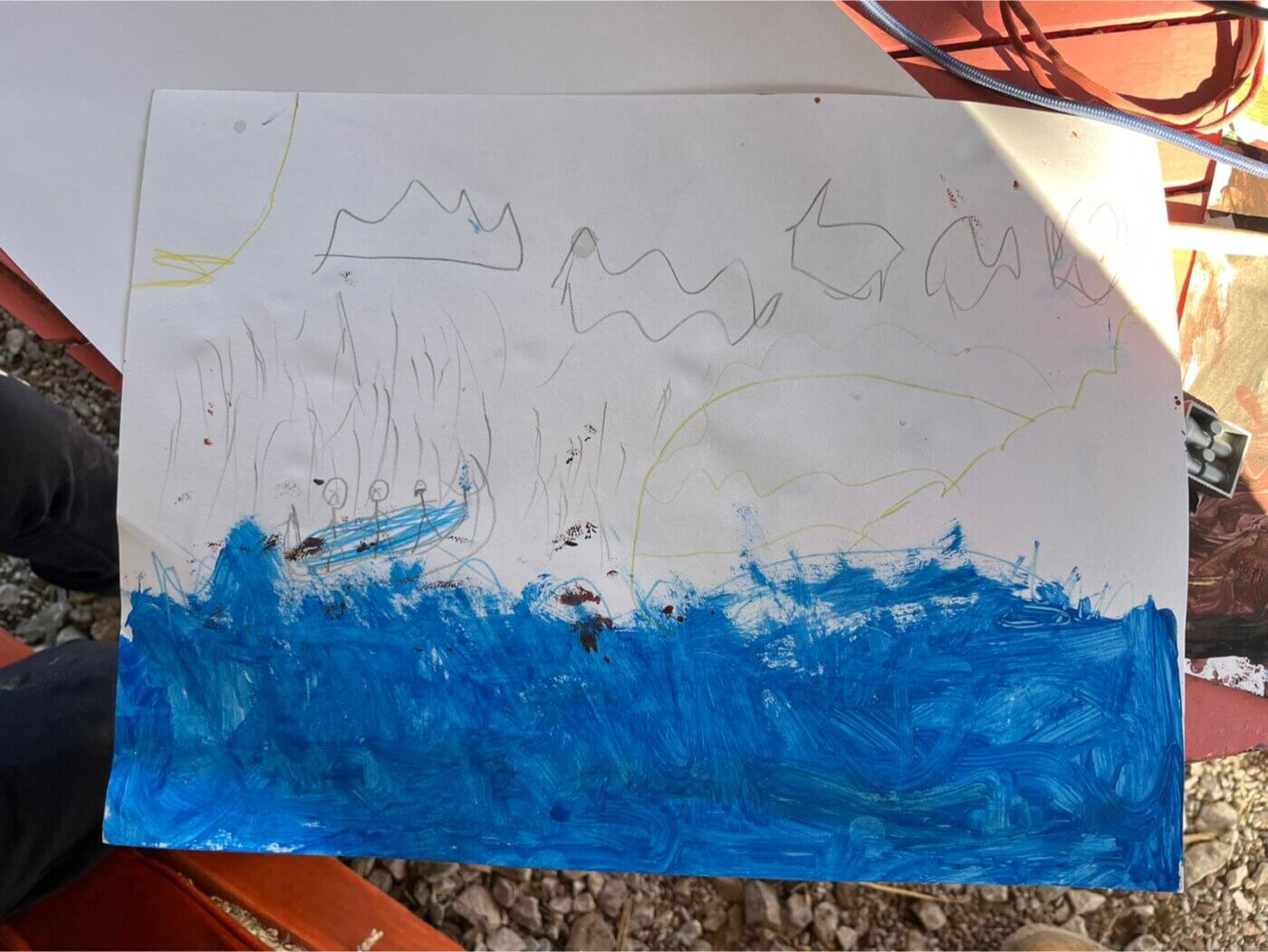
Kid’s drawing
In another corner, the women’s beauty space comes alive. It’s a small garden hidden from the road, protected from curious eyes. No men enter, and no photos are taken. There are only mirrors, nail polish, face masks, and laughter. For a few hours, the outside world fades. We chat, apply masks, paint nails, paint bags. They trust. Not just us, but the space itself. Many take their veil off and many videocall their families.
One night, music fills the air, and The Gardens of Babylon team organize a special party for the women. Some begin to dance, their movements soft and graceful, while others watch quietly from the benches. Not everyone comes from a place where dancing is seen as freedom, but here, something shifts. One young woman from Syria moves so gracefully, her eyes shine. In that single moment, she seems free. She breaths freedom. But just days earlier, we saw her standing in a long line for food in the camp, uncomfortable, constricted by hundreds of others. For a brief moment, she returns to herself, to the life she had before fear and war.
Games with kids, beauty care with women
What happens next?
Every Friday, the organization hosts a special day for pregnant women — workshops on pregnancy, prenatal courses, and yoga sessions, with a nurse available for questions and consultations. Some of us prepare a simple lunch with fresh ingredients, deeply appreciated, since the food in the camp is often low-quality and lacking the nutrients pregnant women need.
One woman arrives with her husband. He stays at a distance from the other women, silent, watching. When he speaks, his eyes are wet: “I feel like I cannot provide for my family. And there is nothing I can do about it.”
Another pregnant woman is preparing the last of her belongings before leaving for Germany. The organization provides her with everything she might need. We ask Irene what happens next for families like hers once they arrive. Her answer sends a chill through us.
They will go to another camp, waiting for documents. Sometimes for years, because bureaucracy moves slowly. Without these papers, they cannot work, cannot earn, cannot plan for the future.
We’ve been in contact with a woman who passed through here five years ago and was sent to Germany. She is still in a camp, still waiting for her documents. No work. No money. No home.
And even once they finally receive the paperwork, the challenges do not end. They have only a few months to find a home and a job. But how can you rent a place, build a life, or make plans after years without the ability to work, to earn, to exist freely?
What do we bring home?
At the end of the week, we gather together to reflect on our week here. No one had shown strong emotions during the week, as Sanne had instructed. We had been so careful not to reveal our feelings in the camp that they only surfaced now. Some of us can no longer contain ourselves, and a few break in tears.
But this is not about us. It is about the people who live in the camp, who have suffered their whole lives in a world that seems unwilling to choose peace. Families torn apart, childhoods disrupted.
We are coming back home and huggign our friends, family, going to work. This will just be a memory of an intense week. We do not bring home experience, we bring home awareness. We carry with us the hope for a better future: for all the people we met, and for everyone who lives in similar circumstances.
Thank you from the bottom of our hearts to Because We Carry, who does such an incredible job supporting these families.
